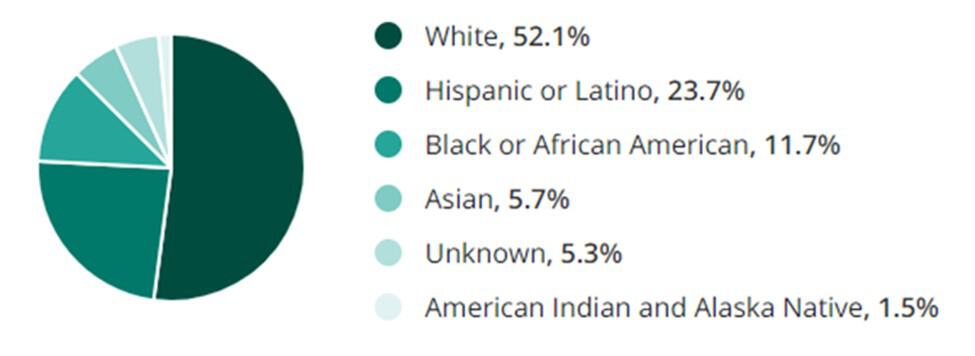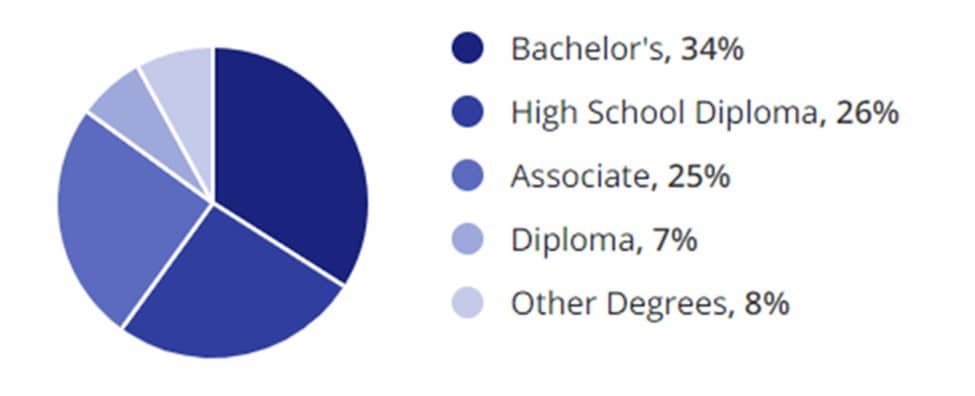Welcome to your ultimate guide to landing your dream job in Security Clearance. In a sphere where safeguarding national secrets is paramount, each role plays a crucial part in the collective endeavor to protect our nation’s security. Here, diversity isn’t just encouraged; it’s essential. The unique backgrounds, experiences, and perspectives that come with a diverse workforce are vital to tackling our country’s complex security challenges.
Whether stepping into the security clearance field for the first time or looking to advance your career further, this guide offers a comprehensive look at what you’ll need to know. From educational requirements and areas of expertise to understanding the current job market and identifying the skills in demand, we’ve got you covered. So, let’s begin this journey together, exploring the lively and critical world of Security Clearance Jobs—a field where diversity meets opportunity and where your career can truly make a difference.
Education Requirements for Security Clearance Jobs
Obtaining a security clearance job in the United States typically demands a minimum educational qualification:
- High School diploma or GED.
- Bachelor’s or even a Master’s Degree.
Candidates aspiring to cybersecurity, intelligence analysis, or defense contracting jobs often benefit from pursuing degrees in relevant fields such as computer science, information technology, criminal justice, or national security studies. Additionally, specialized certifications or training programs related to security clearance protocols and procedures can enhance this sector’s job prospects and advancement opportunities.
Education sets the foundation. However, remember that continual learning and staying updated with the latest security practices are critical to advancing in this field.
Areas of Expertise
In the field of security clearance, the paths one can take are varied and vital for national safety. Understanding these specific areas can help you align your career goals with your skills and interests. Here are some critical areas of expertise:
- Information Assurance: Focuses on protecting and defending information systems. The goal is to ensure data integrity, availability, and confidentiality.
- Intelligence Analysis: Involves interpreting and analyzing information related to security threats. Analysts play a crucial role in foreseeing potential threats and advising on necessary actions.
- Counterintelligence: Essential for preventing espionage and intelligence activities by foreign threats. Professionals in this area work to identify and neutralize potential security breaches.
- Cybersecurity: Given the rise of digital threats, cybersecurity experts are in high demand. They protect networks, systems, and data from cyber-attacks.
Each area requires technical knowledge, analytical skills, and critical thinking. Whether you’re safeguarding sensitive information or analyzing potential threats, your expertise makes a significant difference in upholding national security.
Demographics in the United States
Ethnicity/Race:
The landscape of Security Clearance Jobs in the U.S. showcases the need to focus on a diverse workforce. Here’s a breakdown of the estimated distribution among major ethnic groups:
- White: 52.1%
- Hispanic or Latino: 23.7%
- Black or African American: 11.7%
- Asian: 5.7%
- Unknown: 5.3%
- Native American and Alaska Native: 1.5%
This diversity mirrors the importance of furthering inclusive perspectives in tackling various security issues.

Gender:
Within security clearance careers, the gender distribution is as follows:
- Male: 77%
- Female: 23%
While the field is male-dominated, efforts to balance gender representation are ongoing to ensure equality and open up more opportunities for all.

Age:
Professionals in security clearance positions cover a wide age range, with an average age of over 40. This spectrum suggests:
- Young professionals bring new perspectives and adaptivity, which are essential for evolving security challenges.
- Experienced individuals contribute in-depth knowledge that is invaluable for intelligence and security analysis.
Together, diverse age groups enrich the field, combining fresh ideas with seasoned insights for effective national security measures.

Salary Trends
Salaries in Security Clearance Jobs can vary widely based on role, level of clearance, location, and experience. Here’s a snapshot of what professionals can expect:
- Entry-level security clearance jobs might start around $55,000. These roles often require baseline security clearance and can be stepping stones to more specialized areas.
- Depending on their area of expertise and level of security clearance, mid-level security clearance jobs can see salaries ranging from $75,000 to $100,000.
- Senior-level security clearance jobs, especially those requiring top-level clearance, might exceed $150,000. These positions entail significant responsibilities, influencing national security decisions.
While the numbers can give a rough idea, it’s essential to research specific positions and locations for a more accurate salary outlook. Security clearance jobs offer competitive compensation and provide a sense of purpose by contributing to national safety.
Hiring Trends
The demand for professionals in security clearance jobs remains strong and is shaped by several key trends:
- Increased reliance on technology: As national security becomes more intertwined with technological advancements, cybersecurity, and information assurance roles are seeing significant growth.
- Global security concerns: Ongoing international tensions and the need for robust intelligence operations mean a steady demand for specialists in intelligence analysis and counterintelligence.
- Focus on diversity and inclusion: Organizations recognize the value of diverse perspectives in security roles, leading to broader hiring initiatives aimed at women and underrepresented groups.
The projected growth rate for the industry is about 7% over the next five years, reflecting the critical importance of security professionals in national defense and intelligence. As threats evolve, so does the need for skilled individuals ready to address them.
Education Levels
While many security clearance jobs start with essential on-the-job training, formal education is crucial in career progression. Here’s a glance at the educational background that can set you apart:
- Associate Degrees: An ideal entry point for those new to the field. Associate degrees can lead to initial clearance opportunities and pave the way for further studies.
- Bachelor’s Degrees: A degree in homeland security, cyber defense, or intelligence studies is often a minimum requirement for mid to high-level clearance jobs.
- Advanced Degrees: Pursuing a master’s or doctoral degree can be particularly beneficial for specialized roles in research, policy development, or high-tech security solutions.
- Professional Certifications: Certifications such as CISSP or CompTIA Security+ complement academic qualifications and are highly valued across the security clearance spectrum.
Educational attainment not only enhances your knowledge base but also demonstrates a commitment to your career in national security. Continuous learning and professional development are crucial in this important field.

Skills in Demand
Success in security clearance jobs hinges on your educational background, experience, and specific skills. Here are the most sought-after competencies in this ever-evolving field:
- Intelligence Analysis: The ability to assess and interpret data related to national security threats is critical.
- Cybersecurity Expertise: Skills in defending against cyber attacks and securing information systems are in high demand.
- Counterintelligence: Knowing how to detect, prevent, and neutralize espionage activities is essential for protecting national interests.
- Technical Proficiency: A deep understanding of the technology used in information assurance and cyber defense mechanisms.
- Interpersonal and Communication Skills: The ability to communicate effectively with coworkers, write detailed reports, and clearly present findings are soft skills that have become invaluable.
Additionally, qualities like adaptability, problem-solving, and a dedication to continuous learning are vital to staying relevant in the field. As digital threats evolve, so does the need for innovative and tech-savvy security professionals.
Current & Future Security Clearance Jobs Outlook
The outlook for professionals in Security Clearance Jobs remains robust, with a steady demand driven by national security needs. Here’s what you can expect in the near and distant future:
- Steady Growth: The sector is expected to grow by approximately 7% over the next five years, reflecting the ongoing importance of safeguarding national interests.
- Technological Advancements: As technology advances, there will be an increased need for experts in emerging fields such as artificial intelligence (AI) and blockchain security.
- Diversification: Efforts to diversify the workforce are expected to continue, making the field more inclusive and enhancing problem-solving with varied perspectives.
- Global Impact: Global security concerns and cyber threats are not bound by national borders, suggesting opportunities for international collaboration and positions.
Looking ahead, the dynamic nature of security challenges means there will always be a need for dedicated and skilled professionals in security clearance jobs. Those willing to adapt, upskill, and stay ahead of technological trends will find rewarding opportunities in this essential sector.
FAQ’s
What is a security clearance?
A security clearance is a status granted to individuals, allowing them access to classified information or secure facilities. The level of clearance depends on the sensitivity of the information one must handle.
How can I obtain a security clearance?
To obtain a security clearance, you must be sponsored by a government agency or a contractor. The process includes a thorough background check, fingerprinting, and, in some cases, a polygraph test.
What are the main types of security clearances?
There are three primary levels of federal security clearances: Confidential, Secret, and Top Secret, each requiring a deeper level of investigation.
How long does the clearance process take?
The duration varies depending on the level of clearance and the backlog of applications. On average, it can take from several months to over a year.
Does holding a security clearance improve my job prospects?
Yes, having a security clearance often makes you a more attractive candidate for specific jobs, especially within the defense and intelligence communities, where this status is a prerequisite.
How often do I need to renew my security clearance?
Security clearances need to be periodically reviewed and renewed. Confidential clearances require renewal every 15 years, Secret clearances every 10 years, and Top Secret clearances every five years.
Can a non-U.S. citizen obtain a security clearance?
In rare cases, non-U.S. citizens may obtain a limited clearance. However, most clearances are only granted to U.S. citizens.
What are the different types of Security Clearance Jobs?
Cybersecurity Specialists, Law Enforcement Officers, Military Personnel, Research Scientist, Counterintelligence Specialist.
Additional Resources
Expanding your career in Security Clearance Jobs or entering this field requires access to the correct information. Highly recommended resources below can offer guidance and further insights:
- Defense Counterintelligence and Security Agency (DCSA) offers detailed information about the security clearance process, including application guidelines and FAQs.
- The Office of Personnel Management (OPM) provides insights into the background investigation process, which is critical for understanding how clearances are granted and maintained.
- ClearanceJobs is a valuable platform for those with clearances to find job opportunities, network with other cleared professionals, and stay updated on industry trends.
- For educational resources and online courses related to security and intelligence, check out the offerings at Coursera and edX, which feature programs from top universities and institutions.
Utilizing these resources can significantly enhance your knowledge, help you navigate the security clearance process, and find opportunities in this competitive field.
Conclusion
Security clearance jobs represent an exciting career path and a critical service to the country in the evolving national and cyber security landscape. With a blend of the proper education, skills, and dedication, the opportunities in this field are both rewarding and impactful. Whether you’re just starting or looking to advance your career, staying informed, upskilling, and networking are essential.
We strongly encourage you to join Diversity Employment. You’ll support our mission while gaining access to a wealth of resources and opportunities that can significantly benefit your path in security clearance jobs. Thanks to our resume parsing technology, creating an account and uploading your resume takes only a minute. Be where diversity meets opportunity, and start making your mark in the world of security clearance today.




